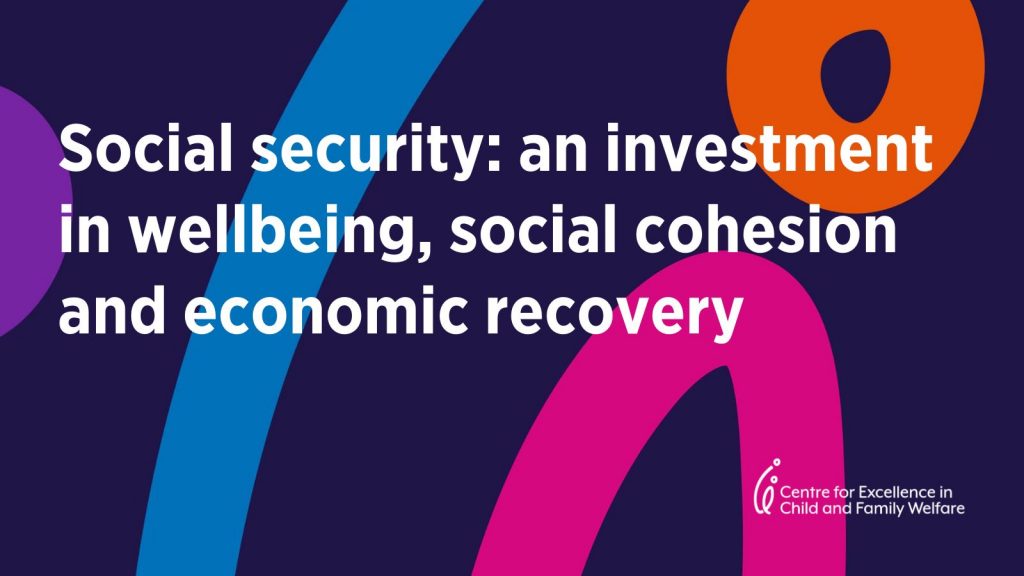The Centre has joined with Brotherhood of St Laurence, Council of Single Mothers and their Children and Grandparents Australia/Grandparents Victoria to prepare a 2020-21 Pre-Budget Submission for the Federal Government.
Our submission focuses on social security reform, because:
- an adequate reliable income provides the foundation for wellbeing, and
- social security is a key investment in social cohesion and economic recovery.
We emphasise that poverty causes individual and social harms in the short and long term. For children, poverty has adverse impacts on development, wellbeing and future outcomes, including poorer health and educational outcomes. It is critically important that social security payments are adequate to prevent poverty and ensure that people can live with dignity.
The Federal Government’s response to COVID-19 was swift and effective, but temporary. Through the introduction of the Coronavirus Supplement, a remarkable number of people were lifted out of poverty, with many more protected from falling into poverty. However, the government has announced that the supplement will be reduced from 25 September, diminishing these positive gains and pushing an estimated 370,000 Australians into poverty.
In a deep economic recession, adequate payments contribute to economic stimulus because households on low incomes spend most of their income. As the COVID-19 crisis eases, the job market picks up and the Coronavirus Supplement is no longer needed, payments must be adequately and permanently increased prior to the removal of the supplement. Leaving the base rates unchanged will effectively condemn people to poverty, with both short- and long-term consequences for individuals, families, the economy, and society.
The pandemic has exacerbated underlying inequalities which must be addressed through preventative action in this budget that supports those hit the hardest, delivers voluntary and effective services and ensures no-one is left behind.
We welcomed the move to make work pay, by increasing the amount people on JobSeeker and Youth Allowance (Other) can earn from income before their payments are affected. Retaining this increased allowable income and extending it to other payments would support people to reconnect to the workforce in a way that does not jeopardise their financial security, especially during a time when work is increasingly precarious.
Experiences of poverty have been compounded by punitive compliance requirements such as payment suspensions, which cause stress, hardship and harm. An emphasis on compliance creates barriers rather than breaking them down, necessitating a major overhaul of mutual obligations.
We conclude that government needs to reform social security, so it is fit for purpose now and in the future. We need an approach to social security that values the social safety net as an investment in our nation, advances human rights, builds capabilities and addresses systemic drivers of disadvantage.
We must reinvest in a social security system that can effectively respond to current and future challenges – such a system is a key plank of a strong and cohesive society that alleviates poverty, rather than exacerbating it. The budget must reflect a commitment to invest in social protections that enable a strong, resilient and flourishing nation – for all of us.
To build on the strengths of government action during COVID-19 and prevent high levels of poverty with all the associated harms to individuals and communities, we recommend that the Federal Government adopt the following:
- Maintain the $550 Coronavirus Supplement until the crisis is over, and unemployment returns to pre-COVID levels
- Deliver a permanent and adequate increase to the base rate of social security payments
- Invest in voluntary employment support, training, career advice and guidance and free quality childcare to ensure those hit hardest by the crisis are not permanently left behind
- Extend income support and JobKeeper to people in the Australian community who are currently ineligible, including temporary visas holders, international students and people seeking asylum
- Retain the increased allowable income of $300 per fortnight for JobSeeker Payment and Youth Allowance (other), and extend this to other payments
- Ensure mutual obligations are fair and proportionate, and remove financial penalties that place people, particularly children, at risk
- Ensure automated processes are based on a clear ethical framework, that is regularly and independently monitored and reviewed
- Establish an independent commission to review and set the rates and structure of social security payments, including the conditions that apply to these payments, according to an adequacy benchmark.
You can read the full submission here.
Our organisations are members of Treating Families Fairly, an alliance of child and family service organisations, peak bodies and academics advocating for reform of the social security system, to bring about a more equitable society that upholds the rights of children and supports their wellbeing and development.






